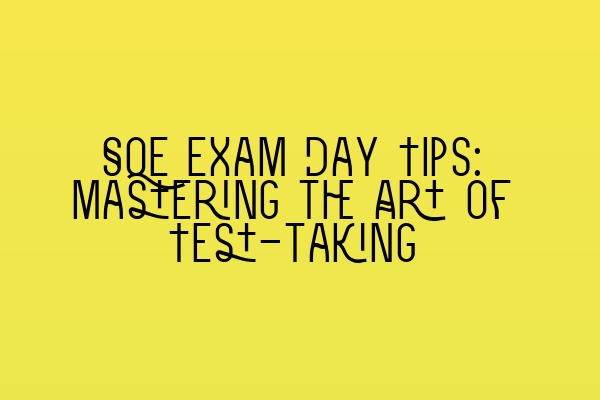SQE Exam Day Tips: Mastering the Art of Test-taking
Welcome to our comprehensive guide on mastering the art of test-taking for the Solicitors Qualifying Examination (SQE). As a solicitor, it is crucial to not only have a solid understanding of the law but also be able to effectively apply that knowledge under exam conditions. In this article, we will provide you with essential tips and strategies to help you excel on your SQE exam day.
Before we dive into the tips, let’s quickly review what the SQE is all about. If you’re new to the SQE or need a refresher, we highly recommend reading our article on “Unveiling the Solicitors Qualifying Examination (SQE): What You Need to Know.”
1. Know the Exam Format
Understanding the format of the SQE is essential for effective preparation and performance. Familiarize yourself with the different assessment methods, such as multiple-choice questions (MCQs), practical legal skills assessments (PLSAs), and online functions tests (OFTs). Knowing what to expect will help you manage your time and mental energy more efficiently.
2. Develop a Study Plan
A well-structured study plan is the key to success in any exam. Break down your study materials into manageable chunks and allocate specific time slots for each topic. Be sure to include regular revision sessions to reinforce your understanding and identify areas that need further attention. Check out our article on “Tips for SQE Success: Key Pointers for a Stellar Performance” for more guidance on effective study planning.
3. Practice with Mock Exams
Practice makes perfect, and this holds true for the SQE as well. Take advantage of our realistic mock exams to familiarize yourself with the exam structure, timing, and question types. Mock exams not only help you identify your strengths and weaknesses but also boost your confidence by replicating the exam environment. Find out more about maximizing your preparation with mock exams in our article on “SQE Mocks Unleashed: Maximizing Your Preparation with Realistic Practice.”
4. Time Management is Key
As the saying goes, time is of the essence. Effective time management is crucial during the SQE exam. Practice answering questions within the given time limits to develop a sense of pacing. Remember to allocate time for reviewing and proofreading your answers. Our article on “SQE Practice Questions: Key to Unlocking Exam Mastery” provides valuable insights on practicing time management during your study sessions.
5. Read and Understand the Questions
Before diving into answering the questions, take a moment to read and understand them thoroughly. Identify any keywords, phrases, or instructions that can provide valuable hints and guidance. Pay attention to subtle differences between answer choices in multiple-choice questions. Always go back to the question to ensure your answer aligns with what is being asked.
6. Manage Exam Stress
Exam stress is natural, but it should never overpower your focus and performance. Prioritize self-care in the days leading up to the exam. Get enough sleep, eat well, and engage in stress-relieving activities such as exercise or meditation. On the exam day, arrive early, take deep breaths, and stay positive. Our article on “Comprehensive SQE Prep Resources: Your Key to Exam Readiness” offers additional strategies for managing exam stress effectively.
7. Don’t Panic Over Difficult Questions
Encountering challenging questions is common in any exam. If you come across a difficult question during the SQE, stay calm and composed. Skim through the other questions and answer the ones you find easier. Prioritize the questions you know and revisit the difficult ones later. Remember, every question carries equal marks, so maximize your chances of scoring well by tackling the questions confidently.
8. Be Mindful of Your Writing
Clear and concise writing is crucial, especially during written assessments. Practice writing legibly and efficiently, allowing adequate time for proofreading and checking for errors. Utilize headings, bullet points, and paragraphs to organize your answers effectively. The goal is to communicate your thoughts coherently and ensure the examiner can easily follow your reasoning.
We hope these tips will help you master the art of test-taking for the SQE. Remember, thorough preparation combined with effective exam strategies is the recipe for success. Best of luck with your SQE exam, and if you have any more questions, feel free to explore our website for additional resources and support.

Leave a Reply